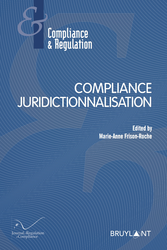Food for thoughts
Thesaurus : Doctrine
► Référence complète : D. Esty et M. Hautereau-Boutonnet, "Derrière les procès climatiques français et américains : des systèmes politique, juridique et judiciaire en opposition", D.2022, p.1606 et s.
____
Compliance and Regulation Law bilingual Dictionnary

Formally, the legal system had constructed the regulatory authorities in the form of Independent Administrative Authorities (AAI).
The stake being to build their independence in an institutional and consubstantial way, the Legislator conferred a new status: that of Independent Public Authority (API). Thus, the Autorité des Marchés Financiers (AMF), the Commission Nationale Informatique et Libertés (CNIL), the Haute Autorité de Santé (HAS) or HADOPI are classified among APIs and not only among IAAs.
We must therefore see two distinct legal categories, AAI on the one hand and APIs on the other.
Thus the two laws of January 20, 2017 relate, to better supervise them, both on AAIs and on APIs, but reading the preparatory work shows that the two categories show that they are treated in a fairly common way. Even more if one consults the sites of certain regulatory authorities themselves, such as HADOPI, for example, it presents itself as an "Independent Public Authority" but defines this legal category as being that which targets the Authorities. Independent Administrative .....
It thus appears that the category of Independent Public Authorities is above all marked by the symbol of a greater dignity than that of the category of "simply" Administrative Independent Authorities. From a technical point of view, the two categories are essentially distinguished from a budgetary point of view, financial autonomy being the nerve of independence. This is how the AMF's budget is based on the size of market operations, through tax mechanisms that are not included in the LOLF. Independence does not extend to autonomy, the API does not negotiate its budget with Parliament, since an Independent Public Authority is not a Constitutional Authority.
Thesaurus : Doctrine

► Full Reference: O. Douvreleur, "Compliance and Judge ruling only on points of Law", in M.-A. Frison-Roche (ed.), Compliance Jurisdictionalisation, series "Compliance & Regulation", Journal of Regulation & Compliance (JoRC) and Bruylant, to be published.
___
► Article Summary (done by the Journal of Regulation): Compliance maintains with the judge complex relations, and even more with the judge ruling only on points of Law (in France, the Court de Cassation in the judicial order, the one who, in principle, does not know the facts that he leaves to the sovereign appreciation of the judges ruling on the substance of the disputes. At first glance, compliance is a technique internalised in companies and the place occupied by negotiated justice techniques leave little room for intervention by the judge ruling only on points of Law
However, his role is intended to develop, in particular with regard to the duty of vigilance or in the articulation between the different branches of Law when compliance meets Labor Law, or even in the adjustment between American Law and the other legal systems, especially French legal system. The way in which the principle of Proportionality will take place in Compliance Law is also a major issue for the judge ruling only on points of Law.
____
________
Thesaurus : Doctrine

Complete reference : Archives de Philosophie du Droit (APD), Droit et économie, tome 37, ed. Sirey, 1992, 426 p.
Read the summaries of the articles in english.
See the presentation of others volumes of Archives de Philosophie du Droit.
Compliance and Regulation Law bilingual Dictionnary

The procedural guarantees enjoyed by a person whose situation may be affected by a forthcoming judgment are mainly the right of action, the rights of defense and the benefit of the adversarial principle.
The rights of the defense have constitutional value and constitute human rights, benefiting everyone, including legal persons. The mission of positive Law is to give effect to them in good time, that is to say from the moment of the investigation or custody, which is manifested for example by the right to the assistance of a lawyer or the right to remain silent or the right to lie. Thus the rights of the defense are not intended to help the manifestation of the truth, do not help the judge or the effectiveness of repression - which is what the principle of adversarial law does - they are pure rights, subjective for the benefit of people, including even especially people who may be perfectly guilty, and seriously guilty.
The rights of the defense are therefore an anthology of prerogatives which are offered to the person implicated or likely to be or likely to be affected. It does not matter if it possibly affects the efficiency. These are human rights. This is why their most natural holder is the person prosecuted in criminal proceedings or facing a system of repression. This is why the triggering of the power of a tribunal or a judge offers them in a consubstantial way to the one who is by this sole fact - and legitimately - threatened by this legitimate violence (one of the definitions of the State ).
The rights of the defense therefore begin even before the trial because the "useful time" begins from the investigation phase, from the searches, even from the controls, and continues on the occasion of appeals against the decision adversely affecting the decision. The legal action being a means of being a party, that is to say of making arguments in its favor, and therefore of defending its case, shows that the plaintiff in the proceedings also holds legal defense rights since he is not only plaintiff in the proceedings but he also plaintiff and defendant to the allegations which are exchanged during the procedure: he alleged to the allegation of his opponent is not correct.
They take many forms and do not need to be expressly provided for in texts, since they are principled and constitutionally benefit from a broad interpretation (ad favorem interpretation). This is the right to be a party (for example the right of intervention, the right of action - which some distinguish from the rights of the defense - the right to be questioned, such as the right to be brought into question (or examination), right to be assisted by a lawyer, right to remain silent, right not to incriminate oneself, right of access to the file, right to intervene in the debate (the rights of the defense thus crossing the adversarial principle), right to appeal, etc.
It is essential to qualify an organ as a tribunal because this triggers for the benefit of the person concerned the procedural guarantees, including the rights of the defense, which on the basis of Article 6 of the European Convention on Human Rights man was made about the Regulators yet formally organized in Independent Administrative Authorities (AAI). This contributed to the general movement of jurisdictionalization of Regulation.
Thesaurus : Doctrine

► Référence complète : S. Mouton, "Dimensions constitutionnelles de l'Obligation de Compliance", in M.-A. Frison-Roche (dir.), L'obligation de Compliance, Journal of Regulation & Compliance (JoRC) et Dalloz, coll. "Régulations & Compliance", 2024
____
📕lire une présentation générale de l'ouvrage, L'obligation de Compliance, dans lequel cet article est publié
________
Compliance and Regulation Law bilingual Dictionnary

The Office of Communications (Ofcom) is the UK's communications regulator.
This independent regulator is competent both for television, radio and television services, but also for the post office.
In addition, there are very diverse missions, such as not only the allocation of licenses but also data protection or public policies of diversity and equality.
We can consider that these are the broadest competences that can be conferred on a regulator with regard to "communication" activities
Teachings : Droit de la régulation bancaire et financière - semestre 2022

Le plan des 6 cours d'amphi est en principe actualisé chaque semaine au fur et à mesure que les cours se déroulent en amphi.
S'il s'avère que la crise sanitaire conduit à ramasser la mise à disposition de l'ensemble du cours en début de semestre, cette actualisation ne sera pas possible.
Cela sera alors compensé par l'envoi en courriel tout au long du semestre d'actualités commentées liées à la matière.
____
Voir le plan ci-dessous⤵
Thesaurus : Doctrine

► Full Reference: B. Deffains, "Debt as the basis of the Compliance Obligation", in M.-A. Frison-Roche (ed.), Compliance Obligation, Journal of Regulation & Compliance (JoRC) and Bruylant, "Compliance & Regulation" Serie, to be published
____
📘read a general presentation of the book, Compliance Obligation, in which this article is published
____
► Summary of the article (done by the Journal of Regulation & Compliance - JoRC): The contribution builds on the definition of Compliance in that it requires large companies to contribute to the achievement of Monumental Goals, including the preservation of human rights and systems, e.g. climate system.
This requirement is confronted with the notion of Debt as it results today from classic and new works available in economic science. In fact, in the primitive economy, debt refers not only to exchanges, but also to an ethical and social obligation leading back to the collective. The Economic Analysis of Law has highlighted this situation, where some of the entities involved in a situation benefit from positive externalities, or endure negative externalities on their own, thus creating a situation of debt: this generates an obligation to correct market failure through an obligation to manage risks, as expressed by Compliance Obligation. This implies that economic calculation can be used to quantify this debt, leading to new proposals for biodiversity accounting.
The author then highlights the recognition of Debt as the source of an Compliance Obligation. This can be expressed through the classical notion of natural obligation, which can be traced back to the French Civil Code, or through more solidarist or political conceptions of Law, linked to moral responsibility, with the overall moral equilibrium referring to civic duty, superimposed on the accounting equilibrium. The political dimension is very much present, as shown by Grotius and Kant, then Bourgeois (solidarism), Rawls and Sen (social justice), who link the deep commitment of each individual with the group. This sheds light on the essential role played by the State and public institutions in formalising and enforcing the Compliance Obligation, not only to ensure its effectiveness, but also to make everyone aware of its fairness dimension.
____
🦉This article is available in full text to those registered for Professor Marie-Anne Frison-Roche's courses
________
Publications

🌐follow Marie-Anne Frison-Roche on LinkedIn
🌐subscribe to the Newsletter MAFR Regulation, Compliance, Law
____
► Full Reference: M.-A. Frison-Roche, "Concevoir l'Obligation de Compliance : faire usage de sa position pour participer à la réalisation des Buts Monumentaux de la Compliance" ("Conceiving the Compliance Obligation: Using its Position to take part in achieving the Compliance Monumental Goals"), in M.-A. Frison-Roche (ed.), L'Obligation de Compliance, Journal of Regulation & Compliance (JoRC) and Dalloz, "Régulations & Compliance" Serie, 2024, to be published
____
📝read the article (in French)
____
🚧read the bilingual Working Paper on the basis this contribution has been built, with more developments, technical references and hyperlinks.
____
📕read a general presentation of the book, L'Obligation de Compliance, in which this article is published
____
► English summary of this contribution: Rather than getting bogged down in definitional disputes, given that Compliance Law is itself a incipient branch of Law, the idea of this contribution is to take as a starting point the different regimes of so many different compliance obligations to which laws and regulations subject large companies: sometimes they must apply them to the letter and sometimes they are only penalised in the event of fault or negligence. This brings us back to the distinction between obligations of result and obligations of means.
Although it might be risky to transpose the expression and regime of contractual obligations to legal obligations, starting from this observation in the Compliance Evidentiary System of a plurality of obligations of means and of result, depending on whether we are dealing with this or that technical compliance obligation, we must first classify them. It would appear that this plurality does not constitute a definitive obstacle to the creation of a single definition of the Compliance Obligation. On the contrary, it makes it possible to clarify the situation, to trace the paths through what is so often described as a legal jumble, an unmanageable mass of regulations.
Indeed, insofar as the company obliged under Compliance Law participates in the achievement of the Monumental Goals on which this branch of Law is normatively based, a legal obligation which may be relayed by contract or even by ethics, it can only be an obligation of means, by virtue of this very teleological nature and the scale of the goals targeted, for example the happy outcome of the climate crisis which is beginning or the desired effective equality between human beings. This established principle leaves room for the fact that the behaviour required is marked out by processes put in place by structured tools, most often legally described, for example the establishment of a vigilance plan or regularly organised training courses (effectiveness), are obligations of result, while the positive effects produced by this plan or these training courses (efficacy) are obligations of means. This is even more the case when the aim is to transform the system as a whole, i.e. to ensure that the system is solidly based, that there is a culture of equality, and that everyone respects everyone else - all of which come under the heading of efficiency.
The Compliance Obligation thus appears unified because, gradually, and whatever the various compliance obligations in question, their intensity or their sector, its structural process prerequisites are first and foremost structures to be established which the Law, through the Judge in particular, will require to be put in place but will not require anything more, whereas striving towards the achievement of the aforementioned Monumental Goals will be an obligation of means, which may seem lighter, but corresponds to an immeasurable ambition, linked with these Goals. Moreover, because these structures (warning platforms, training, audits, contracts and clauses, etc.) only have meaning in order to produce effects and behaviour leading to changes converging towards the Monumental Goals, it is the obligations of means that are most important and not the obligations of result. The judge must also take this into account.
Finally, the Compliance Obligation, which therefore consists of this interweaving of multiple compliance obligations of result and means of using the Entreprise's position, ultimately aims at system efficiency, in Europe at system civilisation, for which companies must show not so much that they have followed the processes correctly (result) but that this has produced effects that converge with the Goals sought by the legislator (effects produced according to a credible trajectory). This is how a crucial economic operator, responsible Ex Ante, should organise itself and behave.
________
Compliance and Regulation Law bilingual Dictionnary

"Liberalization" refers to the process of the legal end of a monopolistic organization of an economy, a sector or a market, in order to open it up to Competition.
Since it is rare for an economy to be entirely monopolistic (which presupposes an extreme concentration of political power), the phenomenon is more particularly characteristic of public sectors. Liberalization, if it is translated into Law only by a declaration of openness to Competition, is actually achieved only by a much slower implementation of the latter, since the incumbent operators have the power to check the entry of potential new entrants. This is why the process of liberalization is only effective if strong regulatory authorities are established to open up the market, weakening incumbent operators where necessary and offering benefits to new entrants through asymmetric regulation .
This Regulation aims to build Competition, now permitted by law.
This is why, in a process of Liberalization, Regulation aims to concretizeCcompetition by constructing it. This transitional regulation is intended to be withdrawn and the institutions set up to disappear, for example by becoming merely specialized chambers of the General Competition Authority, Regulation being temporary when linked to liberalization.
It is distinct from the Regulation of essential infrastructures which, as natural monopolies, must be definitively regulated. Quite often, in liberal economies, the State has asked public enterprises to manage such monopolies, particularly in the network industries, to which it has also entrusted the economic activity of the entire sector. By the liberalization phenomenon, most States have opted to retain the management of infrastructure for this operator, now an incumbent operator competing on the competing activities offered to consumers. In this respect, the Regulator forces it in two ways: in a transitional way to establish competition for the benefit of new entrants, in a definitive way insofar as it has been chosen by the State to manage the economic monopoly of infrastructure.
Even in the only relationship between competitors, Regulation has difficulty to retreat, and this often due to the Regulator. Max Weber's sociological rules administration show about administration that the regulatory authorities, even in view of the purpose of competitive development, for example in the field of telecommunications, seek to remain, even though competition has actually been built. It does it by finding new purposes (in the above sector, the regulator could be the guardian of Net Neutralityt) or by affirming to practice a permanent "symmetric Regulation".
Thesaurus : Doctrine
Référence complète : Boy, , "Réflexion sur le "droit de la régulation". A propos du texte de Marie-Anne Frison-Roche", D., chron., 2001, p.3031 et s.
____
Thesaurus : Doctrine
Référence complète : Lalande, P.-A., Le pouvoir d’injonction au service de la réparation du préjudice écologique : une mise en œuvre de l’office du juge administratif en matière climatique, Actu-Juridique, 9 décembre 2021.
____
_____
Compliance and Regulation Law bilingual Dictionnary

First of all, the Regulation and Compliance Law is difficult to understand in others languages than English, through translation, for example in French. This corpus of rules and institutions suffers from ambiguity and confusion because of its vocabulary of Anglophone origin, in which words or expressions that are similar or identical have not the same meaning in English and, for example, in French..
To every lord all honor, this is the case for the term "Regulation".
In English, "regulation" refers to the phenomenon which the French language expresses by the term "Régulation". But it can also aim at the complete fitting of what will hold a sector reaching a market failure and in which regulation is only one tool among others. The expression "regulatory system" will be used with precision, but also the term "Regulation", the use of the capital letter indicating the difference between the simple administrative power to take texts ("regulation") and the entire system which supports the sector ("Regulation"). It is inevitable that in a quick reading, or even by the play of digital, which overwrites the capital letters, and the automatic translations, this distinction of formulation, which stands for a lower / upper case, disappears. And confusion arises.
The consequences are considerable. It is notably because of this homonymy, that frequently in the French language one puts at the same level the Droit de la Régulation ("regulatory law, Regulation") and the réglementation (regulation). It will be based on such an association, of a tautological nature, to assert that "by nature" the Regulatory Law is "public law", since the author of the reglementation (regulation) is a person of public law, in particular the State or Independent administrative authorities such as Regulators. There remains the current and difficult justification for the considerable presence of contracts, arbitrators, etc. Except to criticize the very idea of Regulatory Law, because it would be the sign of a sort of victory of the private interests, since conceived by instruments of private law.
Thus two major disadvantages appear. First of all, it maintains in the Law of Regulation the summa divisio of Public and Private Law, which is no longer able to account for the evolution of Law in this field and leads observers, notably economists or international Institutions, to assert that the Common Law system would be more adapted today to the world economy notably because if it does indeed place administrative law, constitutional law, etc., it does not conceive them through the distinction Law Public / private law, as the Continental system of Civil Law continues to do.
Secondly, no doubt because this new Law draws on economic and financial theories that are mainly built in the United Kingdom and the United States, the habit is taken to no longer translate. In other languages, for example, texts written in French are phrases such as "le Régulateur doit être accountable".
It is inaccurate that the idea of accountability is reducible to the idea of "responsibility". The authors do not translate it, they do not recopy and insert it in texts written in French.
One passes from the "translation-treason" to the absence of translation, that is to say to the domination of the system of thought whose word is native, here the U.K. and the U.S.A.
One of the current major issues of this phenomenon is in the very term of "Compliance". The French term "conformité" does not translate it. To respect what compliance is, it is appropriate for the moment to recopy the word itself, so as not to denature the concept by a translation. The challenge is to find a francophone word that expresses this new idea, particularly with regard to legal systems that are not common law, so that their general framework remains.
Thesaurus : Doctrine
Compliance and Regulation Law bilingual Dictionnary

In an ordinary market of goods and services, access to the market is open to everyone, whether it is the one who offers the good or service (potential supplier) or who wants to own it (potential applicant ). Freedom of competition presupposes that these new entrants can, at their will, become effective agents on the market, the potential supplier if its entrepreneurial dynamism drives him there, and the potential applicant if he has the desire and the tools to do it(money, Information and proximity, in particular ; but first of all, money). The absence of barriers to entry is presumed; a barrier resulting from anti-competitive behavior will be penalized ex post by the competition authority.
The barrier is therefore what undermines the principle of access to the market. This is why the World Trade Organization (WTO), in that it fights against barriers to ensure global free trade, can be regarded as a forerunner of a sort of World Competition Authority.
But it may happen that it is necessary to organize by the force of Law the market access in a first situation, when there has been a liberalization decision of a previously monopolistic sector, access can not be exercised solely by the strength of demand and the power of potential new entrants, notably prevented by the de facto power of the formerly monopolistic enterprises. The Regulatory Authority will build access to sectoral markets whose sole principle of Competition has been declared by Law. Secondly this necessity can also result from phenomena that definitely impede this ideal competitive functioning of the sector, such as natural monopolies or asymmetries of information: Law will make this access concrete by distributing rights of access to the interested operators.
This is the case in network industries for operators' access rights to essential infrastructure networks. Even if this act is carried out by contract, this contract merely crystallizes a right of access conferred by the Legislator to the operator in order this one can penetrate the market. This is particularly true in the energy and telecommunications sectors.
In a more political way and not directly related to a desire to set up competition or to compensate for a market failure, this access organization may still be required because there is a political decision to provide everyone with access to common goods. The decision then goes hand in hand with the notion of a "fundamental right", such as the fundamental right of access to the healthcare system or vital medicines, or the fundamental right of access to the digital system, which the Regulator becomes the guardian in Ex Ante but also in Ex Post.
Thesaurus : Doctrine
Référence : Beauvais, P., Méthode transactionnelle et justice pénale, in Gaudemet, A. (dir.), La compliance : un nouveau monde? Aspects d'une mutation du droit, coll. "Colloques", éd. Panthéon-Assas, Panthéon-Assas, 2016, pp. 79-90.
Voir la présentation générale de l'ouvrage dans lequel l'article a été publié.
Compliance and Regulation Law bilingual Dictionnary

The Federal Communications Commission (FCC) is the independent regulatory authority in the United States that regulates at the federal level both the container and the content of telecommunications.
In this, the United States differs from the European Union, a legal space in which most often the regulatory institutions of the container and the content are distinct (for example in France ARCEP / CSA / CNIL) and in which the regulations of communications remain substantially at the level of the Member States of the Union.
Like other audiovisual regulators, it ensures pluralism of information by limiting the concentration of capital - and therefore of power - in the television and radio sector. We can thus see that the American system is not in principle different from the European system.
In addition, the FCC is characterized first of all by a very great power, imposing at the same time substantial principles on the operators, like that of the "decency", going in the name of this principle until sanctioning television channels which had let show a bare breast of a woman. The control is therefore more substantial than in Europe, this control weighing against the constitutional freedom of expression which is more powerful in the United States than in Europe. It is true that today the leading digital companies tend to formulate for us what is beautiful, good and decent, in place of public authorities.
The FCC continued to develop the major principles of the public communication system, as in 2015 that of the Open Internet (Open Internet) or to formulate the principle of "digital neutrality", adopted by a federal law, this principle having considerable economic and political implications.
But at the same time, a general mark of American law, the judge moderates this power, according to the principle of Check and Balance. Thus the Supreme Court of the United States in FCC v. Pacifica Foundation in 1978 this power of direct control of the content but also operates the control of the control.
The election in 2016 of a new president who is, among other things, totally hostile to the very idea of Regulation is a test in the probative sense of the term. In January 2017, he appointed a new president of the FCC, hostile to any regulation and in particular to the principle of neutrality. The question which arises is to know if technically a regulation already established on these principles can resist, how and for how long, a political will violently and expressly contrary. And what will the judges do.
Thesaurus : Doctrine

► Référence complète : P.-Y. Gautier, « Contre le droit illimité à la preuve devant les autorités administratives indépendantes », Mélanges en l'honneur du Professeur Claude Lucas de Leyssac, LexisNexis, 2018, p.181-193.
____
📘 Lire une présentation générale de l'ouvrage dans lequel l'article est publié
Compliance and Regulation Law bilingual Dictionnary

Legally, the State is a public law subject defined by territory, people and institutions. It acts in the international space and emits norms. Politically, it has the legitimacy required to express the will of the social body and to exercise the violence of which it deprives the other subjects of law. It is often recognizable by its power: its use of public force, its budgetary power, its jurisdictional power. These three powers, declining or being challenged by private, international and more satisfying mechanisms, some predicted the disappearance of the State, to deplore it or to dance on its corpse.
With such a background, in current theories of Regulation, primarily constructed by economic thought and at first sight one might say that the State is above all the enemy. And this for two main reasons. The first is theoretical and of a negative nature. The advocates of the theory of regulation deny the State the political qualities set out above. The State would not be a "person" but rather a group of individuals, civil servants, elected officials and other concrete human beings, expressing nothing but their particular interests, coming into conflict with other interests, and using their powers to serve the former rather than the latter as everyone else. The Regulation theory, adjoining the theory of the agency, is then aimed at controlling public agents and elected representatives in whom there is no reason to trust a priori.
The second reason is practical and positive. The State would not be a "person" but an organization. Here we find the same perspective as for the concept of enterprise, which classical lawyers conceive as a person or a group of people, while economists who conceive of the world through the market represent it as an organization. The state as an organization should be "efficient" or even "optimal". It is then the pragmatic function of the Regulation Law. When it is governed by traditional law, entangled by that it would be an almost religious illusions of the general interest, or even the social contract, it is suboptimal. The Regulation purpose is about making it more effective.
To this end, as an organization, the State is divided into independent regulatory agencies or independent administrative authorities that manage the subjects as close as possible, which is fortunate in reducing the asymmetry of information and in reviving trust in a direct link. The unitary, distant and arrogant State is abandoned for a flexible and pragmatic conception of a strategic state (without capital ...) that would finally have understood that it is an organization like any other ...
Competition law adopts this conception of the State, which it posed from the beginning that it was an economic operator like any other. This is how this conception which would be more "neutral" of the world is often presented.
Successive crises, whether sanitary or financial, have produced a pendulum effect.
Now, the notions of general interest or common goods are credited of an autonomous value, and the necessity of surpassing immediate interests and of finding persons to bear superior interests or to take charge of the interests of others, even a non-immediate one, emerged.
Thus, the State or the public authority, reappears in the globalization. The Compliance Law or the Corporal Social Responsibility of the crucial companies are converging towards a consideration of the State, which can not be reduced to a pure and simple organization receptacle of externalities.
Thesaurus : Doctrine

► Full Reference: F. Raynaud, "The administrative judge and compliance", in M.-A. Frison-Roche (ed.), Compliance Jurisdictionalisation, coll. "Compliance & Regulation", Journal of Regulation & Compliance (JoRC) and Bruylant, 2023, p.
____
📘read a general presentation of the book, Compliance Jurisdictionalisation, in which this article is published
____
► Summary of the article:
________
Compliance and Regulation Law bilingual Dictionnary

Le légicentrisme exprime avant tout une bataille de normes, puisque cette doctrine pose que la loi est la seule et unique expression de la souveraineté de la Nation. En cela, la loi dispose d'une autorité indépassable et c'est elle qui fonde l'État légal.
Ainsi, si l'on devait donner une figure au système juridique, ce serait un cercle avec en son cœur d'une façon unique la loi souveraine, à la fois autosuffisante dans son fondement (souveraineté) et dans sa production (principe de légalité).
Cette conception moniste (unité de la loi) a pour principale source la philosophie politique de Jean-Jacques Rousseau, c'est encore sur celui-ci que la France conserve le principe de souveraineté parlementaire (le Gouvernement est responsable devant le Parlement) et de souveraineté de la loi. Mais depuis la Révolution française, les esprits et les faits ont changé.
Ainsi, s'est construite une doctrine inverse : le "pluralisme juridique" qui pose en contradiction que le droit vient de nombreuses sources, comme la coutume, les pratiques, les jugements, etc. Il n'est pas étonnant que les auteurs qui affirment le pluralisme juridique ne viennent pas de la philosophie politique mais davantage de la sociologie comme Gurvitch ou Carbonnier.
En outre, les frontières nationales ont perdu de leur consistance, de fait et de droit. C'est pourquoi un auteur comme Mireille Delmas-Marty s'appuie sur le fait même de la construction de l'Europe des droits de l'homme d'une part et de la globalisation d'autre part pour affirmer que le légicentrisme a fait place à un pluralisme juridique généralisé.
Cependant, en droit positif les textes restent les mêmes. C'est ainsi que l'article 6 de la Déclaration des droits de l'homme et du citoyen de 1789, qui fait partie du bloc de constitutionnalité, dispose de la loi que "la loi est l'expression de la volonté générale".
De la même façon, l'article 5 du Code civil continue d'interdire au juge de rendre des jugements contraignants pour d'autres cas que celui particulier sur lequel il se prononce.
Cette permanence des textes les plus gradés, à savoir l'article 5 du Code civil et l'article 6 de la déclaration pose de nombreux problèmes aux juges. En effet, depuis l'arrêt du Tribunal des conflits Blanco, le droit administratif n'est plus lié par ce qui est posé par le Code civil et sans doute la puissance normative du Conseil d'Etat s'exprime plus ouvertement que celle de la Cour de cassation, qui feint de ne rendre que des arrêts de principe pour pouvoir affirmer qu'elle ne rend pas d'arrêt de règlement.
D'une façon plus complexe, le Conseil constitutionnel rappelle régulièrement que certes il est le gardien de la norme constitutionnelle supérieure à la loi mais quand le même temps, seul le législateur, puisque celui est le souverain, peut exprimer la volonté générale, ce à quoi le Conseil constitutionnel ne peut se substituer.
Mais le Droit de l'Union européenne, qui constitue un Ordre juridique à la fois autonome et dont les normes sont pourtant intégrées dans les ordres juridiques des Etats-membres, rend difficilement soutenable la conception du légicentrisme. Y a succédée une hiérarchie des normes complexes. Mais les fondements politiques de l'idée de légicentrisme alimente en grande partie l'hostilité à l'égard de l'Europe, aussi bien celle de l'Union que celle de la CEDH.
Teachings

Une dissertation juridique suit les règles de construction et de rédaction généralement requises pour les dissertations d'une façon générale mais présente certaines spécificités.
Le présent document a pour objet de donner quelques indications. Elles ne valent pas "règles d'or", mais un étudiant qui les suit ne peut se le voir reprocher. La correction des copies tiendra compte non seulement du fait que les étudiants ne sont pas juristes, ne sont pas habitués à faire des "dissertations juridiques", mais encore prendra en considération le présent document.
Compliance and Regulation Law bilingual Dictionnary

La présomption est une dispense de preuve lorsqu'elle est établie par la loi. Elle est un raisonnement probatoire lorsqu'elle est présentée devant un juge, raisonnement qui permet d'établir un fait pertinent à partir d'une preuve indirecte. Il constitue en cela un déplacement d'objet de preuve.
On distingue les présomptions légales, lorsque c'est le législateur qui a posé comme établi un fait, ce qui engendre alors non plus un déplacement d'objet de preuve, mais une dispense de preuve pour celui qui doit supporter normalement la charge de preuve.
Lorsque l'adversaire à l'allégation n'est pas autorisé à rapporter la preuve contraire à l'allégation, la présomption est irréfragable. Parce que la présomption irréfragable est une dispense définitive de preuve, elle soustrait la réalité d'un fait à l'obligation d'être prouvé. La présomption équivaut alors à une fiction. Parce qu'il s'agit d'un artefact, on affirme généralement que seul le législateur a le droit de poser des présomptions irréfragables. Ainsi, la présomption de vérité qui s'attache à la chose définitivement jugée est une présomption légale irréfragable. Celle-ci est alors une pure règle de fond, ici l'incontestabilité des décisions de justice contre lesquelles il n'existe plus de voies de recours d'annulation disponible.
A côté des présomptions légales, existent les "présomptions du fait de l'homme", expression traditionnelle pour désigner les raisonnements probatoires précités que les parties présentent au juge. Comme il s'agit de preuves véritables, ayant donc pour objet de reconstituer la vérité, elles ne peuvent pas être irréfragables, et ne peuvent entraîner qu'une alternance des charges de preuve, au détriment du défendeur à l'allégation. La présomption du fait de l'homme est toujours simple.
Si la jurisprudence établit pourtant des présomptions qu'elle pose comme incontestables, cela signifie simplement qu'elle a établie comme une règle de fond, comme la responsabilité des parents du fait des enfants, antérieurement une responsabilité pour faute présumée aujourd'hui une responsabilité aujourd'hui. Cela n'est que l'expression de la jurisprudence source de droit, c'est-à-dire de la jurisprudence au même niveau que le législateur.
____
Exemple concret
Une personne, A, est retrouvée blessée sur la chaussée. Elle prétend que l'auteur du dommage est le propriétaire d'un vélo qui a freiné brutalement et l'a renversée avant de prendre la fuite. Il n'y a pas de témoin. Elle soutient qu'il s'agit de son voisin, B, dont le vélo, est endommagé. Elle démontre qu'il existe sur le bitume des traces de peinture et de pneus, qui correspondent aux entailles du vélo de B., observation faite qu'il a changé ses pneus le lendemain même de l'accident.
A soutient le raisonnement suivant au juge : je dois démontrer que B m'a renversée (objet direct de preuve), ce que je ne peux faire directement. Mais je peux prouver que son vélo est endommagé, qu'il a changé les pneus, que les entailles du vélo correspondent aux traces relevées sur le sol où a eu lieu l'accident, que B a changé ses pneus le lendemain même de l'accident : on peut, par ces preuves indirectes, présume un lien de causalité. Ainsi, la preuve est apportée non directement, mais par raisonnement.
Si le juge admet le raisonnement, comme la présomption n'est pas irréfragable, la question probatoire ne sera pas réglée, il opérera simplement un renversement de charge de preuve. B, défendeur à l'allégation, sera recevable à démontrer que ces éléments, le changement des pneus, l'endommagement de l'ossature du vélo, ont d'autre chose. S'il apporte ces preuves, alors il aura brisé la présomption simple, et le demandeur, qui supporte le risque de preuve, aura perdu le procès. S'il ne les apporte pas, alors le demandeur, grâce à la présomption, aura gagné son procès.
_______
Compliance and Regulation Law bilingual Dictionnary

These essential infrastructures are monitored by regulators not only for the operators to have a concrete right of access but also for a complete network of these infrastructures to be built in a space, especially in Europe, for example to achieve a European railway system.
These infrastructures also exist in banking, financial and insurance matters, which it would be futile to oppose too easily to Network industries, as financial centers are based on huge computer systems, internalized clearing houses, which are themselves Infrastructure, deserving Regulation.
In this way, the optimal infrastructure solidity, the Regulator having its final responsibility in a permanent control over the manager, whether the State or an operator - whether the operator is an operator Public or a private operator -, and the competitive dynamism of the sector that the system can also entrust to the same regulator.
This is particularly the case in Financial Regulation, which aims to optimize the places, which compete with each other, and their respective security, which itself constitutes a competitive advantage, common to all operators.